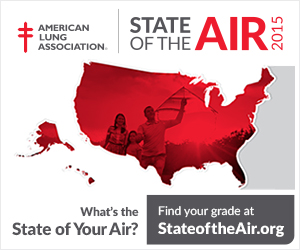A new report shows some improvements in ozone levels in metro Atlanta and in Macon, though both areas still have significant air quality problems.
The American Lung Association’s “State of the Air 2015” report, released Wednesday, gave a failing grade on ozone to six Georgia counties: Cobb, DeKalb, Fulton, Gwinnett, Henry and Rockdale. All are in metro Atlanta.
The report, which covers data from 2011, 2012 and 2013, gave Bibb County (where Macon is located) a D on ozone. The Macon/Warner Robins area was ranked 20th among U.S. cities with the highest year-round particle pollution.
“We saw improvement,’’ said June Deen, with the Lung Association in Georgia. “It’s not a vast improvement.”
Georgia has made progress on air pollution since the first State of the Air report 16 years ago, Deen said. “There’s still a lot of work to be done to make our air healthy for all of us to breathe.”
Georgia counties getting A’s for ozone levels were Chatham and Glynn along the coast; Chattooga in northwest Georgia; Muscogee (the Columbus area); Coweta, south of Atlanta; Dawson, north of Atlanta; and Sumter in South Georgia. Among the cleanest U.S. cities for ozone were Brunswick, Savannah/Hinesville/ Statesboro, Rome/Summerville, and Bainbridge.
The coastal areas of Georgia benefit from Atlantic air currents that can help disperse pollutants, Deen said Thursday.
Ozone and particle pollution, or soot, are the most widespread air pollutants and among the most dangerous. Ground-level ozone, a main ingredient of smog, has harmful effects, especially on children, older adults, people with respiratory illnesses, and those who work outdoors.
Ozone, a variant of oxygen, plays a necessary role in the upper reaches of the atmosphere but is unhealthy for living creatures. At ground level, it is created by the reaction of sunlight on emissions from vehicles and other sources.
Metro Atlanta air pollution problems stem from population growth, traffic congestion, and “a lack of a large transit system,’’ Deen said. The Metropolitan Atlanta Rapid Transit Authority (MARTA) has a relatively large ridership but operates in only a few of the region’s counties.
Exposure to particles can increase the risk of hospitalization for asthma, damage to the lungs, lung cancer and premature death.
Metro Atlanta “is the place to worry about’’ in Georgia, said Barry Ryan, an environmental health professor at Emory University. “We’re not as bad as Los Angeles or Houston, or some places in the Northeast during summer.”
“We’ve gotten better over the last 15 to 20 years,’’ Ryan said Thursday.
But he noted that Atlanta and the South in general tend to have ozone problems due to more sunlight and warmer temperatures. “Ozone is really hard to control,’’ Ryan said. “We can still crank down [ozone] a little bit here,’’ but a major reduction would be difficult to achieve, he added.
Coastal Georgia has less population and vehicle emissions, along with favorable air currents, Ryan said.
Deen noted that there was a glitch in the EPA’s data-gathering on particle pollution in the metro Atlanta area, largely due to the impact a winter storm in January 2011 had on monitoring sites and laboratories.
Nationally, the Lung Association report found mixed progress on air quality. Many cities experienced strong improvement, while others suffered worse episodes of unhealthy air. Nearly 138.5 million people — almost 44 percent of the nation — live where pollution levels are too often dangerous to breathe, the report said.
The improvements in air pollution stem from the implementation of the Clean Air Act during the Nixon administration more than 40 years ago, Deen said. That has led to cleaner diesel and other fuels, along with cleaner power plants, she said.
She also said more alternative sources of power are being used. Georgia’s Legislature this year passed a bill making it easier and more affordable for Georgia homeowners and small businesses to put solar panels on their rooftops.
But she noted the General Assembly also eliminated tax breaks for the purchase of electric cars. It also added a $200 annual registration fee on all alternative-fuel vehicles.
“That was a real blow,’’ Deen said, “and short-sighted.”


